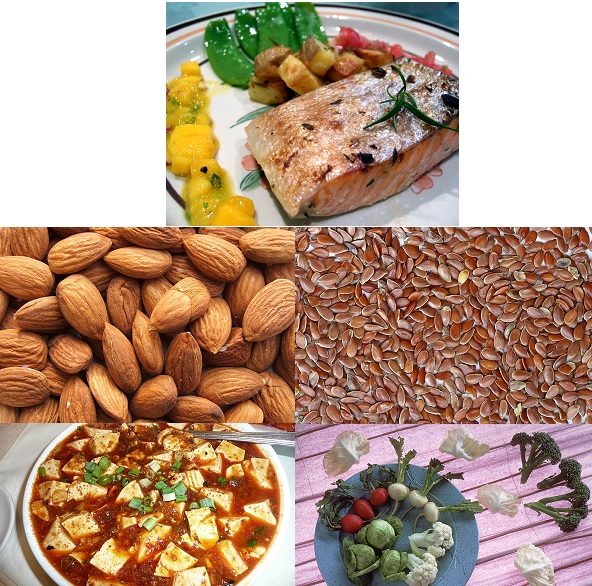Positive Health Online
Your Country

Top 5 Foods to Eat During the Menopause
listed in women's health, originally published in issue 291 - January 2024
Tofu
Tofu is a great addition to a stir fry or curry. It is made from soya beans, which contain plant chemicals called isoflavones. These act like oestrogen in your body.
Asian women experience hot flushes much less frequently than women in America or Europe.[1] It is believed that this is at least partly due to their traditional diet which includes more soya.
There have been many positive studies on the effect of soya isoflavones on menopausal symptoms, particularly relating to hot flushes.[2]
As well as containing beneficial oestrogens, tofu contains around 12g of protein and 200mg of calcium in an average 100g portion. Calcium is vital for healthy bones and nerves and if you don’t eat many dairy foods, tofu is a useful way to boost your calcium. Tofu is vegan and gluten free to boot.
The negative press around soya has focussed on isolated compounds of soya, rather than the traditional soya foods eaten in China and Japan.
There are also substances in raw soya that can cause problems in your digestive system. However, when soya beans are soaked and cooked to make tofu, these substances are removed. Some other raw vegetables such as potatoes also contain them.
 ]
]
Picture Credit: Oily Fish, Almonds, Flax Seeds, Tofu and Cruciferous Vegetables on Wikipedia
Flaxseeds
Flaxseeds are not only nutritious, they taste good sprinkled on porridge or muesli or added to smoothies. They have a nutty flavour and a crunchy texture. You can also add them to soup before serving and make desserts with them. When cooking with flaxseeds, heat them as little as possible to avoid damaging the fats.
Flaxseeds are high in fibre – two tablespoons contain 4 grams of your 30g government recommended daily fibre requirements. Constipation can be a problem in menopause. The fibre in flaxseeds help prevent this by making your stools more bulky and moving them through your intestines.[3]
Some of the fibre from flaxseeds is fermented in your gut and helps grow good bacteria which keep your intestines healthy.
Flaxseed might help with weight loss too. One study showed a significant loss of body weight and a reduced waist measurement after eating flaxseeds.[4,5]
This is thought to be because flaxseeds make you feel fuller for longer so you eat less food.
Almonds
Almonds are high in protein and fibre which help stabilise your blood sugar levels and keep you full.[6,7]
Snacking on almonds helps you feel fuller for longer and therefore helps reduce the amount of calories you eat.[8]
Almonds are a good source of vitamin E, an important vitamin during the menopause and one that is not so widely available in the average diet. A study in 2012 found that over three quarters of Britons and Americans were obtaining less than the minimum government recommended daily intake of vitamin E.[9]
Vitamin E is a key vitamin for heart health. According to the British Heart Foundation, heart disease kills twice as many women as breast cancer.[10]
Menopausal women are more at risk of heart disease because of reduced levels of oestrogen, a heart protective hormone.
High blood pressure increases the risk of heart problems. Vitamin E may help keep your blood pressure healthy.[11]
Vitamin E may also help reduce hot flushes.[12] In as study, women were given 400iu vitamin E or a placebo for a month. The vitamin E reduced the severity and frequency of hot flushes.
Vitamin E is a powerful antioxidant.[13] This means it protects your brain from oxidative stress. Oxidative stress contributes to cognitive issues such as poor memory and concentration. These are common complaints in menopause.
Oily Fish
Oily fish contains the omega 3 fats DHA and EPA. These have been widely studied for their effects on mood.[14,15]
The role of EFAs in brain function is no surprise since the brain contains such a high proportion of fat (around 60%).
Many studies have found omega 3 to be of benefit for depression. Since low mood is common amongst menopausal women, it is certainly worth increasing your intake of omega 3. Oily fish such as salmon, mackerel and sardines are the best source of omega 3. If you are vegan, flax oil or hemp oil contain omega 3, although most of the studies relating to mood have been done on fish oil.
Omega 3 fats are also beneficial for skin health. During menopause skin can often flare up or become very dry. A review of 38 studies found that omega 3 improved inflammatory skin conditions such as acne, dermatitis and psoriasis.[16]
Finally, studies consistently show an association between higher levels of DHA and EPA in the body and heart protective effects.[17]
Cruciferous Vegetables
There are well established scientific links between higher vegetable intake and prevention of heart disease and cancer. However certain specific vegetables may be especially beneficial for menopausal women. The family of vegetables known as cruciferous vegetables include cabbage, cauliflower, kale, kohlrabi, bok choi and Brussels sprouts.
These vegetables contain a plant chemical called sulphoraphane which is part of the flavonoid family of plant chemicals. It may influence the way you metabolise oestrogen in your body.
Oestrogen is broken down into different types, one of which is linked with breast cancer. It’s important to keep the ratio of “good” oestrogen higher than the “bad” oestrogen. The plant chemical in cruciferous vegetables is thought to help shift the oestrogen ratio in favour of the less harmful oestrogen.[18]
So you’ve no excuse not to eat your greens!
References
- https://pubmed.ncbi.nlm.nih.gov/17487647/
- https://pubmed.ncbi.nlm.nih.gov/25263312/
- https://www.ncbi.nlm.nih.gov/pmc/articles/PMC5944250/S
- https://pubmed.ncbi.nlm.nih.gov/28635182/
- https://www.ncbi.nlm.nih.gov/pmc/articles/PMC5944250/
- https://pubmed.ncbi.nlm.nih.gov/15466943/
- https://onlinelibrary.wiley.com/doi/full/10.1111/j.1753-4887.2009.00189.x
- https://pubmed.ncbi.nlm.nih.gov/24084509/
- https://pubmed.ncbi.nlm.nih.gov/22691229/
- https://www.bhf.org.uk/informationsupport/heart-matters-
- https://pubmed.ncbi.nlm.nih.gov/30846828/
- https://pubmed.ncbi.nlm.nih.gov/17664882/
- https://pubmed.ncbi.nlm.nih.gov/21944940/
- https://pubmed.ncbi.nlm.nih.gov/19499625/
- https://www.ncbi.nlm.nih.gov/pmc/articles/PMC533861/
- https://pubmed.ncbi.nlm.nih.gov/32463305/
- https://pubmed.ncbi.nlm.nih.gov/32085487/
- https://pubmed.ncbi.nlm.nih.gov/10952093/
Comments:
-
No Article Comments available